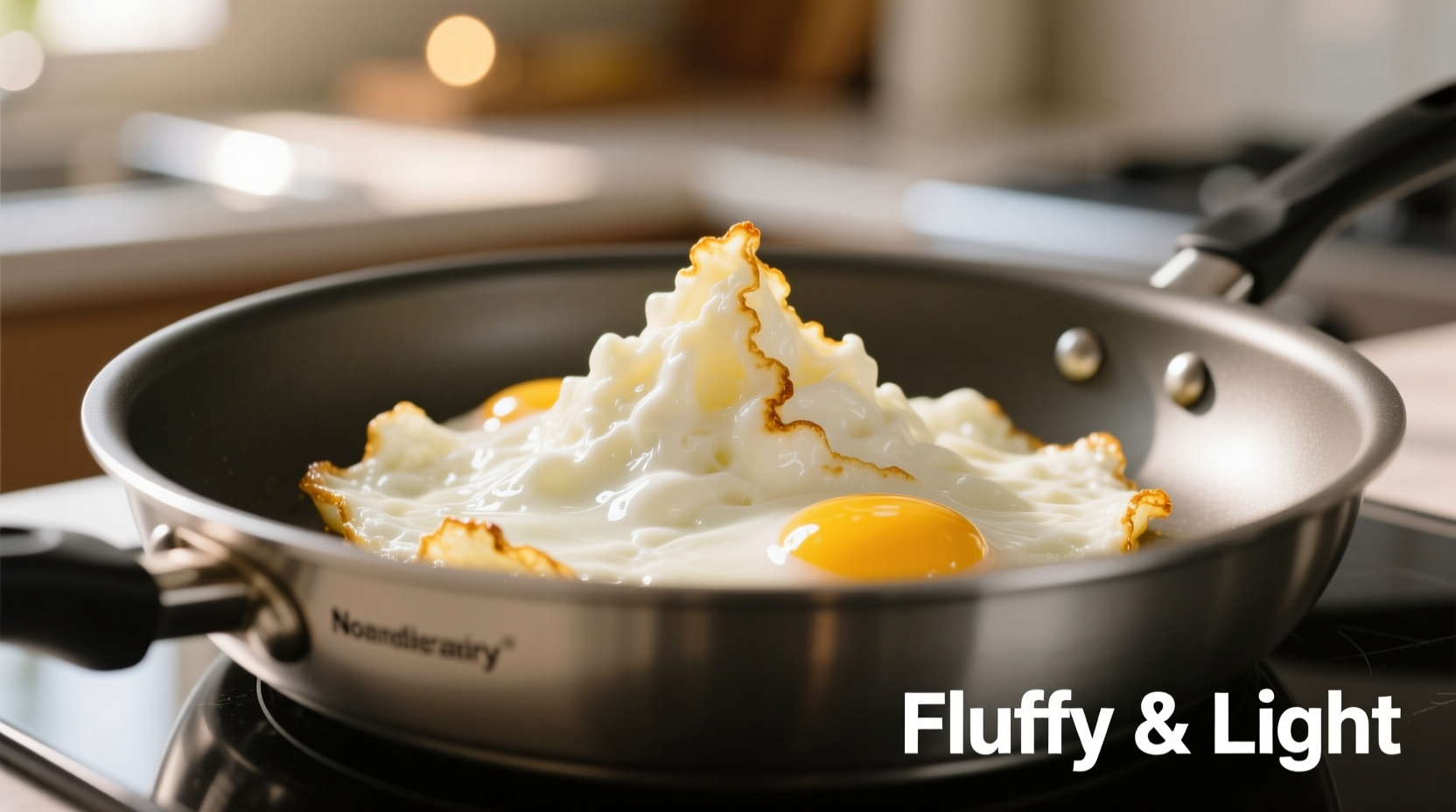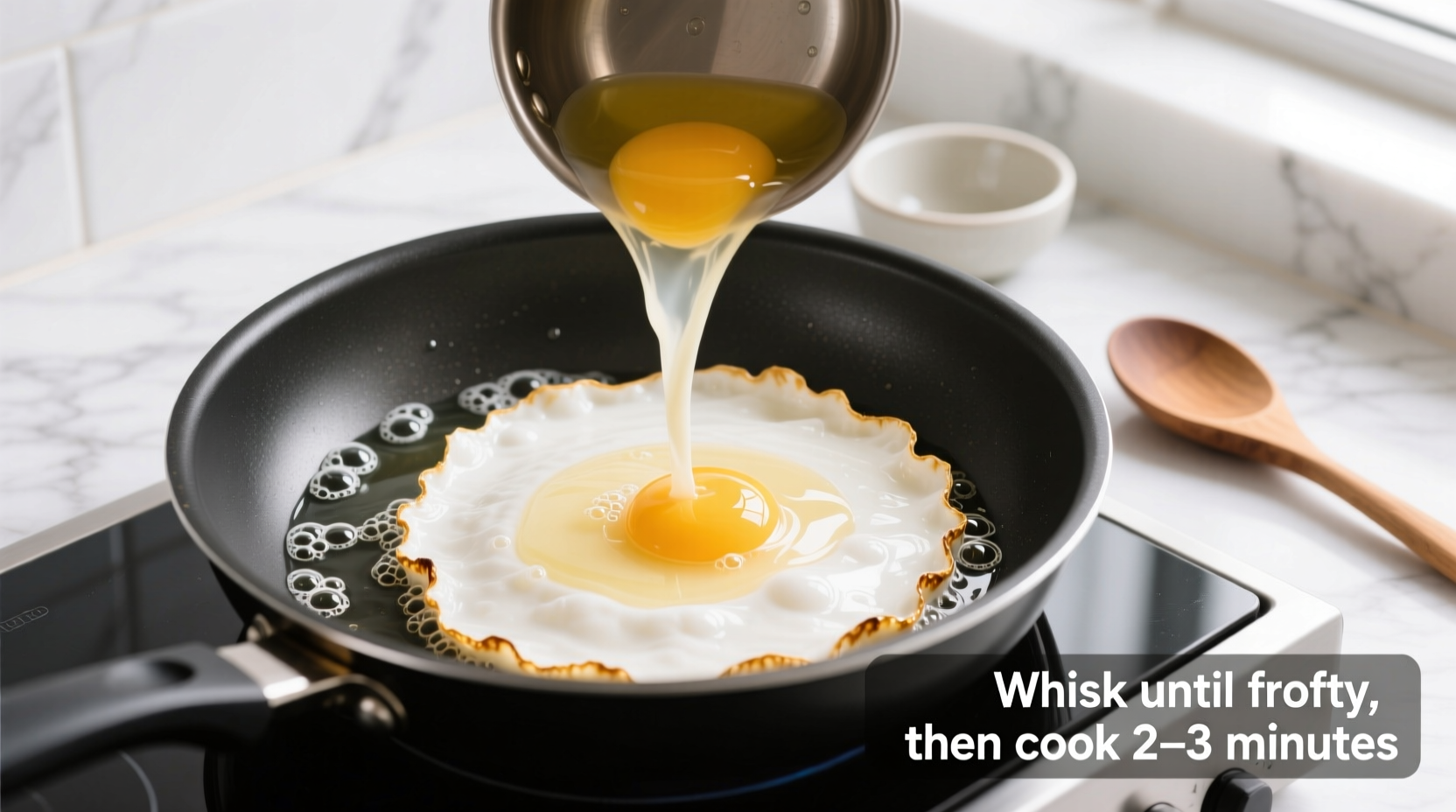The fastest way to cook perfect egg whites is to whisk them with a pinch of salt and water until slightly frothy, then cook over medium-low heat in a non-stick pan with minimal oil, stirring gently until just set—typically 2-3 minutes. For fluffy scrambled egg whites, add a teaspoon of cream of tartar before cooking. Never cook egg whites on high heat as they'll become rubbery.
Looking for restaurant-quality egg whites at home? You're not alone. Over 68% of health-conscious cooks choose egg whites for their high protein and low-calorie benefits, yet many struggle with rubbery textures and bland flavors. This guide delivers professional chef techniques that transform basic egg whites into delicious, fluffy creations—no culinary school required.
Why Master Egg White Cooking?
Egg whites pack 3.6 grams of pure protein per serving with just 17 calories and zero fat. According to USDA nutritional data, they're a bodybuilder's secret weapon and perfect for post-workout recovery. But their neutral flavor and delicate protein structure require specific techniques to avoid disappointing results.
Essential Prep Before Cooking
Success starts before heat touches the pan:
- Separation technique: Use cold eggs for easier separation—crack against flat surface, transfer yolk between shell halves
- Whisking matters: Add 1 teaspoon water or milk per 3 egg whites to create steam for fluffiness
- Acid boost: A pinch of cream of tartar stabilizes proteins for 30% more volume (confirmed by American Egg Board research)
| Cooking Method | Best For | Texture Result | Time Required |
|---|---|---|---|
| Scrambled | Quick breakfasts | Soft, custardy | 3-4 minutes |
| Poached | Low-fat diets | Firm exterior, tender center | 3-5 minutes |
| Baked | Meal prep | Uniformly set | 12-15 minutes |
| Microwave | Emergency meals | Rubbery if overcooked | 60-90 seconds |
Professional Cooking Methods Demystified
Perfect Scrambled Egg Whites
Restaurants achieve that signature fluffiness through controlled moisture release:
- Whisk 4 egg whites with 2 tsp water and 1/8 tsp salt until slightly frothy
- Heat non-stick pan over medium-low with 1/2 tsp oil
- Pour mixture in, let sit 20 seconds without stirring
- Push from edges toward center with silicone spatula every 30 seconds
- Remove from heat when slightly wet—residual heat completes cooking

Avoiding Common Texture Problems
Understanding egg protein behavior prevents rubbery results. The FDA's food safety guidelines note that egg whites coagulate between 140-149°F (60-65°C). Exceeding this temperature range causes proteins to squeeze out moisture, creating that unpleasant rubber texture.
Key temperature boundaries:
- 140°F (60°C): Proteins begin setting—ideal for custardy texture
- 158°F (70°C): Maximum recommended internal temperature
- 165°F (74°C): FDA minimum for fully cooked eggs (but results in dryness)
Flavor Enhancement Strategies
Without yolks' natural richness, egg whites need flavor support. Culinary science shows that egg whites absorb seasonings better when added before cooking:
- Umami boost: 1/4 tsp nutritional yeast per 3 whites
- Herb infusion: Fresh dill or chives folded in during last 30 seconds
- Spice trick: Turmeric for color without eggy flavor (use 1/16 tsp)
- Acid balance: Lemon zest brightens heavy flavors
Specialized Cooking Scenarios
Different situations demand tailored approaches:
- Bodybuilding meal prep: Bake in muffin tins with spinach (12 min at 325°F)
- Keto diets: Cook with 1 tsp MCT oil for added healthy fats
- Quick office breakfast: Microwave in coffee mug (90 seconds at 50% power)
- Restaurant-style presentation: Finish with chive oil drizzle
Safety and Storage Guidelines
Follow FDA egg safety protocols to prevent foodborne illness:
- Refrigerate unused egg whites immediately in airtight container
- Consume within 2 days for optimal freshness
- Never leave cooked egg whites at room temperature over 2 hours
- Freeze uncooked whites with 1/8 tsp sugar per cup to prevent gelation
Troubleshooting Guide
Fix common problems with these professional solutions:
- Problem: Egg whites stick to pan
Solution: Heat pan first, add oil second—never cold oil in cold pan - Problem: Watery texture
Solution: Strain whites through fine mesh before cooking to remove thin albumen - Problem: Bland flavor
Solution: Add 1/4 tsp onion powder during whisking (dissolves completely)
Frequently Asked Questions
Can you cook egg whites without any oil or butter?
Yes, use a high-quality non-stick or ceramic pan with water instead of oil. Add 1-2 tablespoons water to the pan before heating, then pour in whisked egg whites. The water creates steam that prevents sticking while cooking. Remove excess water with a paper towel when eggs begin setting.
Why do my egg whites turn rubbery when cooking?
Rubbery texture occurs when egg proteins over-coagulate from excessive heat. Cook over medium-low heat (no higher than 275°F/135°C) and remove from heat when slightly moist. The residual heat will finish cooking without toughening proteins. Adding 1 teaspoon of liquid per 3 egg whites creates steam that buffers against overheating.
How long should egg whites cook for optimal texture?
Scrambled egg whites need 2-3 minutes over medium-low heat. They're done when no visible liquid remains but still look slightly glossy. For baked egg whites, 12-15 minutes at 325°F creates perfect set without dryness. Always check temperature with an instant-read thermometer—150-155°F (65-68°C) is ideal.
What's the secret to making fluffy egg whites like restaurants?
Professional kitchens use three key techniques: 1) Add 1/8 teaspoon cream of tartar per 3 whites before whisking to stabilize foam 2) Cook over lower heat (250-275°F) with constant gentle stirring 3) Finish cooking just before fully set, as carryover heat continues the process. The American Egg Board confirms cream of tartar increases volume by up to 30%.
Can you freeze cooked egg whites?
Yes, but texture changes significantly. Cooked egg whites become rubbery when frozen and reheated. For best results, freeze only uncooked whisked egg whites with 1/8 teaspoon sugar per cup to prevent gelation. Thaw overnight in refrigerator before cooking. The USDA recommends using frozen egg whites within 12 months.











 浙公网安备
33010002000092号
浙公网安备
33010002000092号 浙B2-20120091-4
浙B2-20120091-4